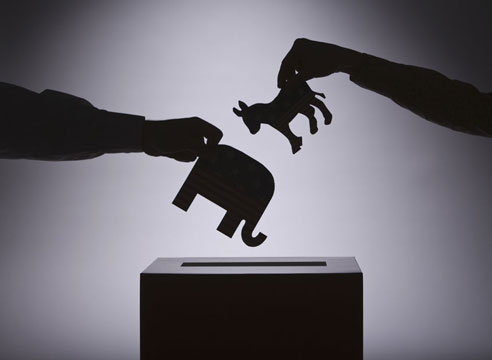Polling and Prejudice: The Third Party Presidential Vote

Recent polls show a highly competitive race between the Democratic and Republican party candidates for president. However, it appears that when polling organizations present the public with a more accurate reflection of the presidential ballot this is simply not the case.
A Gallup poll published last Friday found that roughly 7% of registered voters support a third party candidate for president. Among survey organizations, it is standard practice to exclude all third party and Independent candidates from their presidential tracking polls. The highly unusual poll conducted by Gallup last month included the names of three third party candidates in addition to the Democratic and Republican party nominees for president: Jill Stein of the Green Party, Gary Johnson of the Libertarian Party and Virgil Goode of the Constitution Party.
Of these three candidates, Gary Johnson had the most support at 3%, Jill Stein was preferred by 1% of respondents, and Virgil Goode obtained less than .5% support. Another 2% volunteered the name of Texas Congressman and former Republican party presidential candidate Ron Paul, and 1% volunteered the names of other individuals. A full 5% stated that they would not vote.
Among the major party candidates, President Obama came out on top in the survey at 47%, demonstrating a substantive lead over Republican Mitt Romney, who was preferred by 40% of those polled.
The reasoning behind Gallup's decision to include Johnson, Stein and Goode's names in this particular poll is highly revealing. The “special presidential preference question” includes “the names of all candidates who will appear on the ballot in a large number of states.” In other words, the “special presidential preference question” more accurately reflects the actual ballot choices for the office of president than the usual presidential polling question which only includes the names of the Democratic and Republican party candidates.
An obvious question thus arises: if the “special presidential preference question” is more accurate than the standard presidential preference question, why isn't the special presidential preference question the standard?
One potential response might be that the third party vote is insignificant. No third party candidate in the present poll received more than 3% support. Moreover, the fact that there were more individuals who said they would not vote than there were who said they would support any third party alternative to the Democrat and the Republican underscores the shallowness of the support for these candidates.
Yet, taken together, more than 7% of likely voters in the Gallup poll stated that they would vote for someone other than Obama or Romney and another 5% stated they would not vote for any of the candidates named in the poll. That exceeds the margin of victory between the Democratic and Republican candidates in the last six presidential elections.
Indeed, according to Gallup's own data, the third party vote is highly significant. In Gallup's standard presidential tracking poll, Obama and Romney are in a dead heat, “tied at 46% of the vote among registered voters since Gallup began its tracking program in April.” However, when Gallup presents its survey respondents with a choice that provides a more accurate reflection of the presidential ballot, this is clearly not the case, as the present poll shows Obama with a 7% lead over Romney.
Given this state of affairs, is there any reason – other than political bias – as to why a polling organization would not wish to furnish a more accurate reflection of the ballot in its political preference surveys?
As a final note, though the Gallup report stated that Jill Stein will appear on the November ballot as the Green party's candidate for president, she has not yet been officially nominated by the party. The Greens will be holding their national convention later this week.





